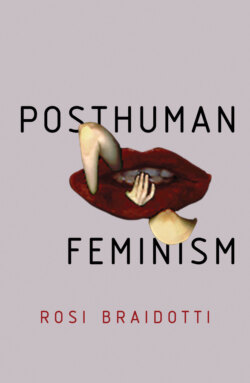Читать книгу Posthuman Feminism - Rosi Braidotti - Страница 18
Conclusion
ОглавлениеLiberal, socialist, Black, anti-colonialist, Indigenous, queer and trans – these feminist variations and critiques of humanism have been important in promoting equality and recognition of the marginalized, excluded and oppressed. In so far as humanism upholds basic democratic rules and fundamental freedoms, it is an integral part of the system in which feminists and other activists have positioned their ongoing struggles for inclusion and equality. The humanist project of emancipation has encouraged the equality of the minorities and motivated forms of activism among women, LGBTQ+, Black, Indigenous and colonized peoples. In this book I therefore assume the relative success of the historical legacy of humanism as supporting equal rights for all. As I wrote in the introduction to this chapter, humanism should not be discarded easily, because some humanistic premises about equality and emancipation are relevant and necessary. Moreover, they have become integral elements of the legal and political systems of advanced democracies, thus the emancipatory potential of the posthuman condition needs to be assessed cautiously (Cudworth and Hobden, 2017). It is a measure of the value and strength of humanism that I am able to write such criticism and have it published, without fearing negative institutional retaliation, beyond the by now predictable mutterings against postmodern relativism in some quarters. It is a fact that one can criticize humanism in the name of humanism and that this gift of freedom does create an insolvable double bind (Said, 2004).
The appeal of humanism is perfectly justified in the light of the long history of injustices and exclusions endured by women and LGBTQ+ people, Black, Indigenous and colonized peoples. As the chosen targets of patriarchal violence, feminicide, homo- and trans-phobia, colonial expropriations and mass killings, they have borne a disproportionate percentage of human suffering. They, or rather, we, are not all human in the same way, and some categories of humans are definitely more mortal than others. Therefore, it is politically impossible not to support the ongoing efforts to extend human rights across all categories in a more equitable manner. At the same time, it has also become urgent to question the alleged self-evidence of the idea of the human at work in the very humanist concept of universal human rights. I think that such an idea needs to be treated with critical care. In a brilliant contribution to the feminist volume Posthuman Bodies (Halberstam and Livingston, 1995), significantly called ‘The end of the world of white men’, the novelist Kathy Acker settles her score with the culture of violent exclusions enforced by patriarchy. In a self-ironical twist, she concludes: ‘If you scratch hard, you find that I’m a humanist in some weird way. Well, humanist, you know what I mean’ (Acker, 1991: 17).
From the posthuman perspective, humanism needs to be reviewed, historicized and assessed critically. Because it is so built into our system, we need to dis-identify with it. It is necessary to cultivate the ability and willingness to practise collective dis-identification and critical distance from, or even disloyalty to (Rich, 1978) the humanistic paradigm. Feminism today cannot only be a revised or updated version of humanism, but needs to look farther and make an extra effort to rise to the contemporary challenges of the posthuman convergence. My emphasis on the need for critical thought is motivated by the analysis of the material and historical conditions of the posthuman convergence. The intersection of advanced technological enhancements of the human and impending environmental depletion of species, tears apart traditional understandings and practices of the human. What used to be the measure of all things, the human body, is now an obsolete piece of machinery by comparison with the speed and liveliness of the new technologies. Nature, far from being an endless reservoir of resources, is impoverished to the point of extinction. Technology, far from being the promise of radiant futures for humanity, is a threat to its very survival.
In order to be worthy of the urgency and complexity of our times, feminism needs to keep engaged with these paradoxes and contradictions. What is at stake for posthuman feminism is how to produce other ways of thinking about the basic units of reference to define the human, what thinking means, how knowledge is produced, and to develop new forms of ethical engagement. In the next chapter I will develop a posthuman critique of humanism and of its feminist variations and inflections, by showing that we need to keep connected to humanism, but also need to move ahead and beyond.
